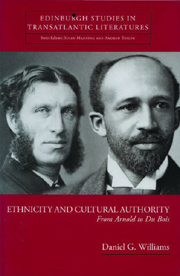Introduction: Culture, Ethnicity, Authority
Published online by Cambridge University Press: 12 September 2012
Summary
In late June 1926, W. E. B. Du Bois took the podium at the annual gathering of the National Association for the Advancement of Coloured People in Chicago. In a convention dominated by speeches on political organisation and group mobility, Du Bois struck a slightly discordant note: ‘How is it that an organization like this, a group of radicals trying to bring new things into the world, a fighting organization which has come up out of the blood and dust of battle, struggling for the right of black men to be ordinary human beings – how is it that an organization of this kind can turn aside and talk about Art?’ Du Bois's message was that artistic achievement had a central role to play in the struggle for social equality and his words, published later that year as ‘The Criteria of Negro Art’, were to become one of the most influential cultural manifestos of what became known as the Harlem Renaissance.
Having drawn a broad outline of his intended topic, Du Bois proceeded to evoke a visit to Scotland:
In the high school where I studied we learned most of Scott's ‘Lady of the Lake’ by heart. In after life once it was my privilege to see the lake. It was Sunday. It was quiet. You could glimpse the deer wandering in unbroken forests; you could hear the soft ripple of romance on the waters. Around me fell the cadence of that poetry of my youth. I fell asleep full of the enchantment of the Scottish border. A new day broke and with it came a sudden rush of excursionists. They poured upon the little pleasure boat, – men with their hats a little on one side and drooping cigars in the wet corners of their mouths; women who shared their conversation with the world. They all tried to get everywhere first. They pushed other people out of the way. They made all sorts of incoherent noises and gestures so that the quiet home folk and the visitors from other lands silently and half-wonderingly gave way before them. They struck a note not evil but wrong. They carried, perhaps, a sense of strength and accomplishment, but their hearts had no conception of the beauty which pervaded this holy place.
- Type
- Chapter
- Information
- Ethnicity and Cultural AuthorityFrom Arnold to Du Bois, pp. 1 - 32Publisher: Edinburgh University PressPrint publication year: 2005



